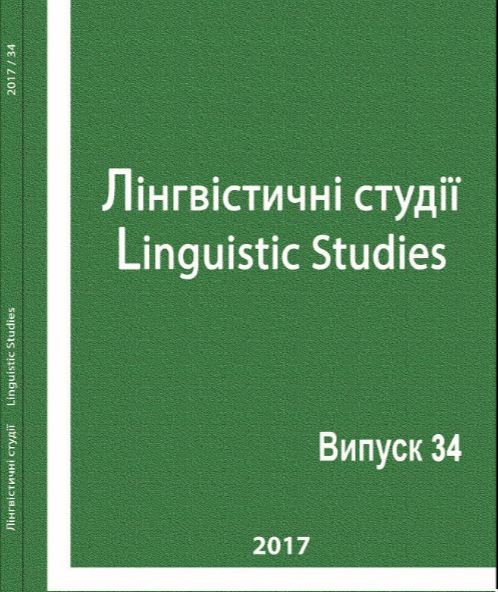Актуальність генетичного зв‘яку опозитів відсутність – присутність для когнітивного вивчення поняття відсутність.
Ключові слова:
когнітивна лінгвістика, методи інтерпретації семантики та етимологічного аналізу, поняття ‘відсутність - присутність‘Анотація
Із застосуванням методу інтерпретації семантики та етимологічного аналізу автором розглянуто абстрактні опозити 'відсутність - присутність'. На основі встановлених генетичних зв‘язків цієї антонімічної пари простежено розвиток та зміну їхньої семантики та граматичної експлікації. Доведено, що представлені поняття мають соціокультурну детермінацію, а поняття 'відсутність' є психологічним ключем для когнітивного розуміння багатьох дефініцій.Посилання
Kibrik, Aleksandr. Kognitivnyi podkhod k yazyku (Cognitive approach to language). Yazyk i mysl‘: Sovremennaya kognitivnaya lingvistika. Moskva: Yazyk 2015: 29-60. Print.
Kubryakova, Elena. Na puti polucheniya znanyi o yazyke: Chasti rechi s kognitivnoi tochki zreniya. Rol‘ yazyka v poznanii mira (On the way to acquiring knowledge about language: The Parts of speech in the cognitive aspect. The role of language in world cognition). Moskva: Yazyki slavyanskoi kultury. 2004. 560. Print.
Kudryavtseva, Natalia. Metodologiya kognitivnych doslidgen‘: perspektivy empirichnogo pidkhodu (The Methodology of cognitive research: the prospects of empirical approach). Movoznavstvo (Linguistics) 1. (2013): 66-76. Print.
Krylov, Grigoriy. Etimologicheskii slovar‘ russkogo yazyka (Etymological Dictionary of Russian). Moskva: Poligrafuslugi. 2005. 432. Print.
Lescheva, Lyudmila. Kognitivnaya lingvistika i terminologicheskaya dvuyazychnaya interpretiruyushchaya leksikografiya (Cognitive linguistics and terminological bilingual interpreting lexicography). Yazyk i mysl‘: Sovremennaya kognitivnaya lingvistika (Language and Thought: Modern cognitive linguistics). Moskva: Yazyk 2015: 411-426. Print.
L‘vov, Michail. Slovar‘ antonimov russkogo yazyka (Dictionary of Russian antonyms). Moskva: AST-PRESS Kniga. 2012. 592. Print.
Onipenko, Nikolay. O funktseonalnoi paradigme glagola BYT‘ (About the functional paradigm of the verb BYT‘ (to be)). Funktseonalnaya lingvistika: problemy i perspektivy. Materiali konferentsii. Yalta, aprel‘1995. Simferopol‘, 1995.74-83. Print.
Potebnya, Aleksandr. Mysl‘ i yazyk (Thought and Language). Kiev: Sinto, 1993. 191. Print.
Fasmer, Max. Etimologicheskiy slovar‘ russkogo yazyka (Etymological Dictionary of Russian). Moskva: Аstrel‘ – АSТ. 2004. Т. 3. 830. Print.
Filosofskiy entsiklopedicheskiy slovar‘ (Philosophical Encyclopedia Dictionary). Moskva:INFRA. 1998. 576. Print.
Chastotnyi slovar‘ sovremennogo russkogo yazyka na materialach Natsional‘nogo korpusa russkogo yazyka. (Modern Russian Frequency Dictionary on the materials of Russian national corps). Moskva: Azbukovnik. 2009. 1087. Print.
Shvedova, Natalia. Eshchyo ras o glagole byt‘ (Once again on the verb BYT‘ (to be)). Voprosy yazykjznaniya (Linguistic Issues) 2. 2001: 3-13. Web. 6 Febr. 2001.
Eko, Umberto. Otsutstvuyushchaya struktura. Vvedeniye v semiologiyu. (The absent structure. Introduction to semiology) SPb: Sympozium. 2004. 544. Print.
Geeraerts D. Methodology in cognitive linguistics. Cognitive linguistics: Current applications and future perspectives. Ibanez. – Berlin; New York, 2006. 21-42. Print.
Moser W. Pour une grammaire du concept de «transfert» appliqué au culturel // Transfert. Exploration d‘un champ conceptuel. Université d‘Ottawa, 2014. 49-77. Print.


